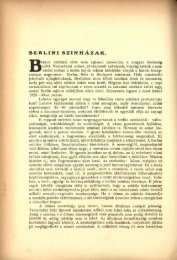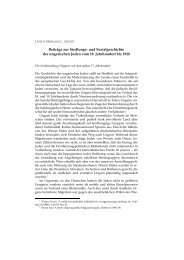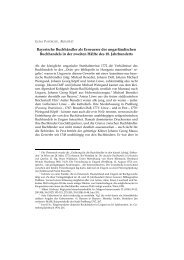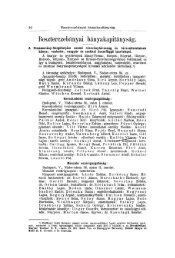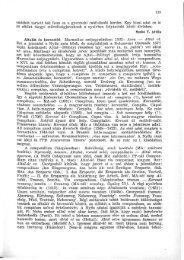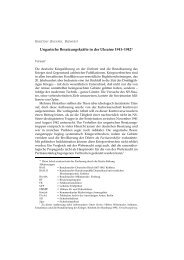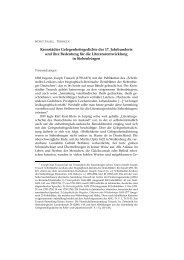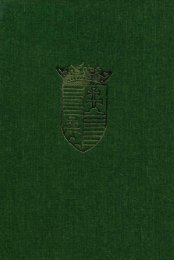hungarian studies - EPA - Országos Széchényi Könyvtár
hungarian studies - EPA - Országos Széchényi Könyvtár
hungarian studies - EPA - Országos Széchényi Könyvtár
You also want an ePaper? Increase the reach of your titles
YUMPU automatically turns print PDFs into web optimized ePapers that Google loves.
134 REVIEWS<br />
questions must be yes. When someone sets out to compile a tome, knowing there is barely<br />
enough first-rate work to flesh out a slim volume, the endeavor cannot end well. If anthologists<br />
want their products to be good, they must extend their responsibility beyond selection to the<br />
very conception of the work, its scope and focus. There can be no defense in lamenting the<br />
paucity of quality poems, translations, etc. An anthology whose nature is governed as much by<br />
accident as by choice does a disservice to its subject and the cause it means to represent. The<br />
Stuffed Owl and its kin aside, good anthologies will reflect what is best in their field. Decisions<br />
on inclusion may come down to arbitrary issues: there is room here for matters of taste, for<br />
constraints put on editors by money, space or time, for the thousand small concerns that can<br />
plague a project. But these decisions should never result from bad research or a faulty initial<br />
concept of the work.<br />
Makkai would have done well to limit the scope of his anthology, if not to a single period,<br />
at least to the most outstanding figures in the last five hundred years. I am confident that<br />
László Arany, Gyula Reviczky, Ödön Palasovszky and several others could have been passed<br />
over without seriously undermining the spirit of the work. In this way, Makkai and his fellow<br />
translators could have concentrated their efforts and might with some luck have come up with<br />
more flattering results. As it is, there are a number of related anthologies better than this,<br />
though none half so Herculean. (1 am thinking, for instance, of Miklós Vajda's Modern Hungarian<br />
Poetry and Thomas Kabdebo's Hundred Hungarian Poems.) For all its generosity and<br />
good faith, In Quest of the 'Miracle Stag ' adds little of substance to the field. It may improve<br />
on Watson Kirkconnell's long and tedious collection, Hungarian Helicon, but only by a hair.<br />
The curious will find more welcoming homes in some of the smaller anthologies and collections<br />
than they will here, and I would send them to any one of these long before recommending<br />
Makkai's palatial accommodations.<br />
In a sense, the publication of this book is an important event. It is even historic on the<br />
modest scale of such things. I fear that in ten years In Quest of the 'Miracle Stag' may also be<br />
of historical interest only, referred to as a document, one of the first of its type, but not very<br />
much read. But this is not for me to decide and, despite this dark prediction, I would be happy<br />
to see the book attract enthusiastic readers. It is terribly flawed (the punctuation is inept from<br />
start to finish and the proofreading a travesty, unleashing such curve balls as "Alan Dixon"<br />
spelled "Aalan Dickson" in the index of translators). Even its critical apparatus is potentially<br />
misleading (the vision of Hungarian history it presents strikes me as largely revision). And yet<br />
I wish Makkai's anthology well, in the belief that it will be of use and interest to someone<br />
somewhere. Though subject to the vicissitudes of fashion, the reputations of peripheral literatures<br />
are resilient (partly because they are marginal), and in the end no single work can do<br />
irreparable harm to the entire body of Hungarian poetry.<br />
Hungarian poetry in English translation is not a field that takes up much territory. Once the<br />
dross has been removed, once the egregiously inept and the mediocre have been expunged,<br />
what is left is not so much a field as a patch of yard, well-tended and brightened by daffodils<br />
and lilies, but a patch of yard all the same. It is a pleasant enough place and I have spent many<br />
idle hours reading in its confines. Each of its parts represents a service done to the whole of<br />
Hungarian poetry and each addition to its ranks offers reason for hope that the field will continue<br />
to grow. Several anthologists have found in it the makings of small, attractive bouquets.<br />
But Makkai had decided to take a more inclusive, monumental approach and seems determined<br />
to play florist to the literary equivalent of a coronation or, as turns out to be more apt, a<br />
state funeral. In his defense I can only suggest that he may have envisioned some source of<br />
decent flowers beyond this humble garden nook.<br />
Indiana University, Bloomington Christof Scheele


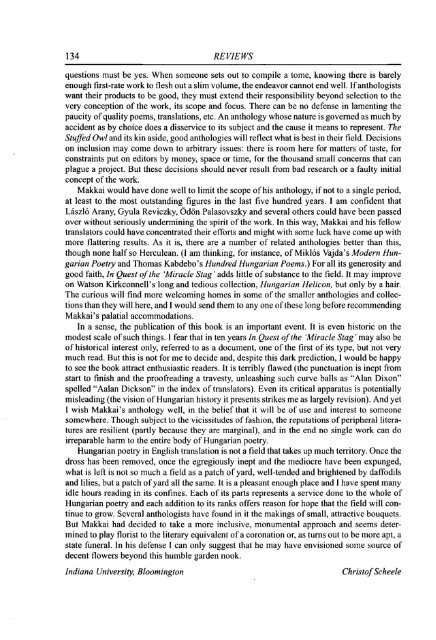
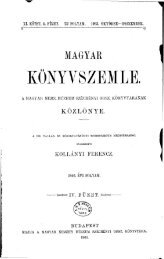
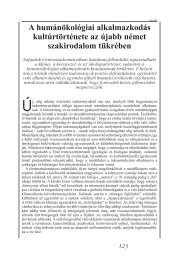
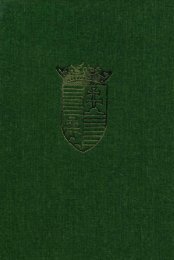
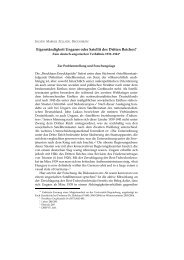
![Letöltés egy fájlban [36.8 MB - PDF] - EPA](https://img.yumpu.com/23369116/1/172x260/letoltes-egy-fajlban-368-mb-pdf-epa.jpg?quality=85)
